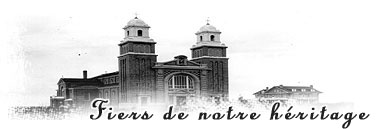


Des lieux
Regina - Une paroisse française serait cause de division
Environ deux semaines avant que le curé de la paroisse cathédrale du Saint-Rosaire, de Regina, l'abbé L.J. O'NEIL, n'ait adressé à l'Archevêque le mémorandum duquel nous avons parlé dans notre chronique précédente, le père J. MAGNAN, O.M.I., Provincial des Oblats du Manitoba, avait eu une rencontre officielle avec S. Exc. Mgr McGUIGAN, le 22 février 1931, à Regina. À cette rencontre, l'Archevêque s'était déclaré disposé à accueillir les missionnaires Oblats à Regina et à leur confier la desserte des catholiques de langue française de la capitale provinciale, si telle était la volonté du Saint-Siège.(1) Entre-temps, pendant une absence de l'Archevêque, le vicaire Général de l'archidiocèse, Mgr JANSSEN, avait signé en date du 14 janvier 1931, avec le T.R.P. MAGNAN, un document accordant aux pères Oblat l'autorisation d'établir une paroisse destinée aux catholiques francophones de Regina, et dont les limites correspondaient à celles de la ville de Regina.
Le débat sur cette question était cependant loin d'être clôturé. En effet, en date du 22 juillet 1931, un autre prêtre anglophone, l'abbé J-C. KEOHAN, curé de la paroisse Sacred Heart, adressait à son tour à Mgr McGUIGAN un mémorandum portant distinctement sur les deux points suivants: 1) la formation d'une paroisse française à Regina, et, 2) sur l'opportunité de confier une telle paroisse aux pères Oblats. Sans doute, si même je préfère que le contenu de nos chroniques historiques soit présenté en français, certaines exceptions s'imposent, spécialement lorsqu'il s'agit de citer des documents importants rédigés en anglais; c'est précisément le cas du mémorandum de l'abbé J.C. KEOIIAN, dont la première partie, se lit comme suit:
«1. It is my humble opinion that the French--speaking Catholics of the city of Regina are not desireous of a National Parish save a few who have been influenced to agitate for same by the Oblates from Lebret. The French and English Catholics are living on most cordial relations, in perfect peace and harmony a condition which, at least, could not be improved by anything which would tend to divide them into two separate groups. For this very reason, several of the French Families in my parish, are decidedly opposed to the formation of such a parish.
2. It seems to me that the reason which justifies a German, Polish and Hungarian National Parish do not exist as regards the French. Socially there is a wider chasm between these three groups and our English-speaking Catholics, due first to language ince the older people do not speak English at all or with great difficulty, and secondly to customs and traditions which they brought with them from the old country and which are not easily changed not perhaps is it adviseable to in any way force a sudden transition, to the customs of this country; thirdly to the fact many of the central Europeans are of the poorer class, are accustomed to class distinction and hence are assimilated more slowly. On the other hand, the social customs of the French and English are the same — all the French speak English quite fluently and the two groups meet in common and intermingle constantly on the same social plane.
3. The tendancy in the West should b to weld together the various groups into one great Canadian Race not perpetuate racial distinction; mistrust and suspicion. This is absolutely necessary, if we are to fight successfully the spirit of bigotry and irreligion, which is so strong today.
4. The French are scattered over the entire city; tó force them to attend one central Parish Church would be, not only an injustice but an impossibility. Likewise, to permit them to attend any church but oblige them to support the French Parish, would be most unfair to the other parishes and injurious to their own Catholicity, as they had no obligations towards it, and less personal interest in the French Parish which they would scarcely if ever, attend.
5. Tending to separate us into two distinct groups, it would lessen the field of choice of our young men and women of marrying age. Hence would come another indirect cause of the already most damaging curse of Mixed Marriages. Every effort should be made to widen the field acquaintance among all our Catholic People in order to offset the daily contact with so many non catholics in their work.»(2)
--
Comme nous l'avons vu, les abbés J.J. O'NEILL et J.C. KEOHAN avaient donc de bien sérieuses objections à formuler à la fondation d'une paroisse française. Cette chanson est d'ailleurs familière aux oreilles des Fransaskois: «une langue, un drapeau»; pour le curé de Sacred Heart l'idéal, même au point de vue religieux, c'était le «melting pot» duquel devait sortir «one great Canadian Race». Pour l'abbé KEOHAN, il fallait encourager, sinon provoquer, des mariages mixtes, au niveau des ethnies. Comme toujours, ce sont des anglophones qui veulent décider ce qui convient le mieux aux francophones, qui voulaient décider pour eux en 1931, s'il leur fallait, ou non, une paroisse nationale, de la même façon qu'ils décident encore des écoles dont ils ont besoin et qui souhaitaient alors, et continuent d'ailleurs à souhaiter, très souvent, l'étouffement de leur langue et de leur culture, en les précipitant le plus vite possible dans le creuset, ou le gouffre, de l'assimilation.
(1) Lettre et mémorandum adressés par le père J. Magnan, O.M.I., en date des 15 et 16 mars 1931 à son Exc. Mgr McGuigan. Archives de l'Archidiocèse de Regina.
(2) Archives de l'Archidiocèse de Regina.
«1. It is my humble opinion that the French--speaking Catholics of the city of Regina are not desireous of a National Parish save a few who have been influenced to agitate for same by the Oblates from Lebret. The French and English Catholics are living on most cordial relations, in perfect peace and harmony a condition which, at least, could not be improved by anything which would tend to divide them into two separate groups. For this very reason, several of the French Families in my parish, are decidedly opposed to the formation of such a parish.
2. It seems to me that the reason which justifies a German, Polish and Hungarian National Parish do not exist as regards the French. Socially there is a wider chasm between these three groups and our English-speaking Catholics, due first to language ince the older people do not speak English at all or with great difficulty, and secondly to customs and traditions which they brought with them from the old country and which are not easily changed not perhaps is it adviseable to in any way force a sudden transition, to the customs of this country; thirdly to the fact many of the central Europeans are of the poorer class, are accustomed to class distinction and hence are assimilated more slowly. On the other hand, the social customs of the French and English are the same — all the French speak English quite fluently and the two groups meet in common and intermingle constantly on the same social plane.
3. The tendancy in the West should b to weld together the various groups into one great Canadian Race not perpetuate racial distinction; mistrust and suspicion. This is absolutely necessary, if we are to fight successfully the spirit of bigotry and irreligion, which is so strong today.
4. The French are scattered over the entire city; tó force them to attend one central Parish Church would be, not only an injustice but an impossibility. Likewise, to permit them to attend any church but oblige them to support the French Parish, would be most unfair to the other parishes and injurious to their own Catholicity, as they had no obligations towards it, and less personal interest in the French Parish which they would scarcely if ever, attend.
5. Tending to separate us into two distinct groups, it would lessen the field of choice of our young men and women of marrying age. Hence would come another indirect cause of the already most damaging curse of Mixed Marriages. Every effort should be made to widen the field acquaintance among all our Catholic People in order to offset the daily contact with so many non catholics in their work.»(2)
--
Comme nous l'avons vu, les abbés J.J. O'NEILL et J.C. KEOHAN avaient donc de bien sérieuses objections à formuler à la fondation d'une paroisse française. Cette chanson est d'ailleurs familière aux oreilles des Fransaskois: «une langue, un drapeau»; pour le curé de Sacred Heart l'idéal, même au point de vue religieux, c'était le «melting pot» duquel devait sortir «one great Canadian Race». Pour l'abbé KEOHAN, il fallait encourager, sinon provoquer, des mariages mixtes, au niveau des ethnies. Comme toujours, ce sont des anglophones qui veulent décider ce qui convient le mieux aux francophones, qui voulaient décider pour eux en 1931, s'il leur fallait, ou non, une paroisse nationale, de la même façon qu'ils décident encore des écoles dont ils ont besoin et qui souhaitaient alors, et continuent d'ailleurs à souhaiter, très souvent, l'étouffement de leur langue et de leur culture, en les précipitant le plus vite possible dans le creuset, ou le gouffre, de l'assimilation.
(1) Lettre et mémorandum adressés par le père J. Magnan, O.M.I., en date des 15 et 16 mars 1931 à son Exc. Mgr McGuigan. Archives de l'Archidiocèse de Regina.
(2) Archives de l'Archidiocèse de Regina.
